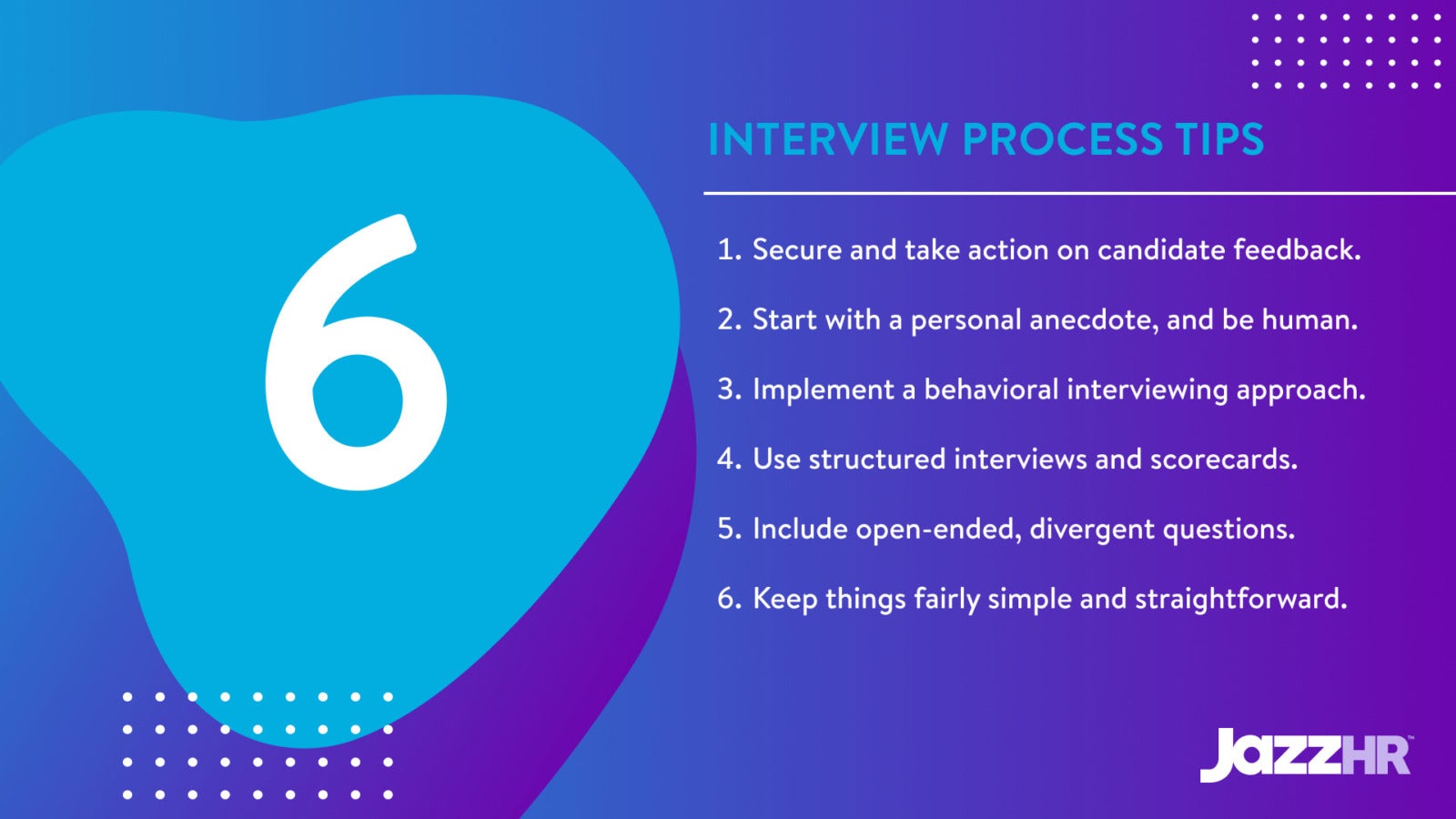Looking for insights and advice to elevate the quality of your interview process? Look no further. Here are six expert tips from those who have long participated in their orgs’ interviewing efforts.
Secure and take action on candidate feedback
Give candidates an easy way to provide feedback about the job interview process and their own journey. By doing so, you can find out what improvements you should make: from the screen phone interview all the way to the final interview.
By getting insights into each step of your interview process, you’ll not only set yourself apart from other businesses’ hiring processes, but also give yourself a better understanding of where you can stand to improve your approach to different types of interviews and better engage job candidates.
Tasia Duske, CEO, Museum Hack
Start out with a personal anecdote, and be human
I’ve always found that a good interview is typically a two-way street and should be a dialogue rather than an interrogation. Try it. Whether it’s an in-person interview or Zoom chat, you can put your interviewees at ease by starting the discussion off with a personal story. (As opposed to jumping right into the question-and-answer portion when you discuss job requirements.)
This can be about anything just so long as it tells them a little about you as a person. This gives them a starting point in seeing you as a person, rather than the arbiter of their fate with being hired at this company or not. It is a simple way to make the interview experience easier for the interviewee and give them a more positive impression, even if they don’t get the job.
Dragos Badea, CEO, Yarooms
Implement a behavioral interviewing approach
Focus as much as you can on behavioral interview questions, particularly during screening interviews and the initial interview with the hiring manager, to best evaluate each candidates’ work approach.
We all know the best indicator of future performance is experience. The format of behavioral interviews forces candidates to speak specifically about their experiences. This gives the interviewer a clear understanding of how they would perform in the future.
Even if a person is relatively inexperienced, you can ask them behavioral questions on their soft skills and work history to determine if they merit advancement in the process and, eventually, a job offer.
Madhurima Halder, Content Manager, Recruit CRM
Use structured interviews and scorecards
Structured job interviews might sound rigid. But, they do help prevent bias and establish fairer hiring practices. Interview scorecards give you a simple, standardized set of criteria you can easily follow as you ask questions about hard or soft skills, experience, and cultural fit.
Only essential criteria should be included on a scorecard to maximize value, while minimizing time spent during the process. Some candidates may find structured interviews impersonal, so it’s critical to explain the process — and your reasoning for using it — long before the interview takes place.
While some employers are hesitant to send out their scorecards ahead of time, it’s relatively easy to weed out the “fakes” through assessments and references. You’ll give those candidates that might not traditionally interview well the chance to prepare, calm their nerves, and bring a more authentic self to the interview.
Maximilian Wühr, Cgo and Co-founder, FINN
Include open-ended, divergent questions
Our interview process, while thorough, involves open-ended, divergent questions to assess their company fit and soft skills more effectively. These questions focus on opening discussions on workplace matters, such as communication, collaboration, and accountability.
There are no right or wrong answers at this interview stage, and we encourage candidates to speak as honestly as possible. It provides valuable insights into how they handle common issues at work. We set a more conversational tone to make the environment feel more relaxed for the candidates. It promotes a smoother two-way discussion for more genuine responses.
Grant Polachek, Head of Branding, SquadHelp
Keep things fairly simple and straightforward
We put in a lot of effort to improve our job interview processes and hire over 300 people. The two things that helped us the most were simpler job descriptions and interview surveys
A lot of companies like to publish these broad, detailed job descriptions. But, our data shows that this approach overcomplicated the process a lot. Instead, we made our job descriptions simple and direct, where almost every element was advertised as a must-have for the interview process.
This helped improve the quality of our interviews and sped up the entire process.
Surveys were an amazing addition as well, and once we started collecting essential data about our interview process, we could recognize and fill up the gaps and thoroughly improve our processes.
Michael Maximoff, Co-founder and Managing Partner, Belkins
Find out how you can streamline your interview process — and all other elements of your recruiting efforts — with our powerful yet easy-to-use applicant trackings system for small businesses.







